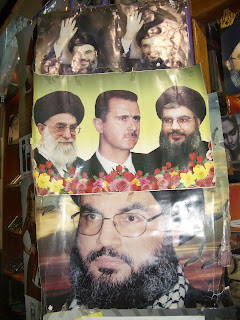
 The iconic power of the men who currently lead fundamentalist Islamic movements in the Middle East is incredible. They are atop a system of clan-based rule over sheepish masses, in which a valiant attempt is made to capitalize on anti-Western sentiments, for good or for ill. By and large, the people who favor these leaders over more pacifist, reasonable, and moderate alternatives make such a radical political choice because of a deeply rooted tribalistic mentality that pits pan-Islamist supranational ideology against the West in all its incarnations. The Arabian tribal concept and its loyalty to the Meccan core is at the heart of this international movement, but in many ways the movement has become more of a political alliance than a religious quest. Religious justification for allegiance to the various manifestations of Iranian sphere of influence has replaced the dominance of Arab supranationalism/pan-Arabism as the region's most potent alternative to Western-style government and society.
The iconic power of the men who currently lead fundamentalist Islamic movements in the Middle East is incredible. They are atop a system of clan-based rule over sheepish masses, in which a valiant attempt is made to capitalize on anti-Western sentiments, for good or for ill. By and large, the people who favor these leaders over more pacifist, reasonable, and moderate alternatives make such a radical political choice because of a deeply rooted tribalistic mentality that pits pan-Islamist supranational ideology against the West in all its incarnations. The Arabian tribal concept and its loyalty to the Meccan core is at the heart of this international movement, but in many ways the movement has become more of a political alliance than a religious quest. Religious justification for allegiance to the various manifestations of Iranian sphere of influence has replaced the dominance of Arab supranationalism/pan-Arabism as the region's most potent alternative to Western-style government and society. In an age when all Middle Eastern societies believe that they are under siege from one direction or another, many countries crave a leader who functions as an omnipotent or least symbolically impregnable father of the people. As a patriarch who exercises power in an authoritarian and often arbitrary manner, the superman reigns supreme. Is this the fundamental nature of Arab political culture? Are Arab societies truly not ready for open democracy? Is it an excessively cultural relativist judgment to state that some societies merely need this form of rule? Posting gigantic images of Assad, Nasrallah, and Ahmadinejad across Syria, Shiite areas of Lebanon gives these places a sense of order and bestows them with the notion that some strongman is protecting them from the malevolence of Israel, Christians, and the West in general.

 One notable phenom that pertains to this wrangling about loyalties and constantly shifting allegiances is the Shi'ite-Sunni rift. It seems that most of this intra-Islamic conflict is about the political might of Iran, not about theological differences. Most Shi'ites, at least in Iraq and Lebanon, have deep historical ties to Iran, either because they became Shi'ite due to Iranian missionary activity or because they have ancestral ties to Iran. Much of the current geopolitical struggle between the icons of Shia Islam and the West is over the tense Cold War developing between Iran and its proxies and the U.S. and its satellites. The influence of Sunni-inspired fundamentalism is perhaps waning. One curious phenom is that Palestinians themselves often refer to Hamas as the Shi'ites or Persians merely due to the source of the movement's funding, suggesting that the region's struggles are often more a function of material conflict and Machivellian political alliances rather than a truly ideological or religious clash.
One notable phenom that pertains to this wrangling about loyalties and constantly shifting allegiances is the Shi'ite-Sunni rift. It seems that most of this intra-Islamic conflict is about the political might of Iran, not about theological differences. Most Shi'ites, at least in Iraq and Lebanon, have deep historical ties to Iran, either because they became Shi'ite due to Iranian missionary activity or because they have ancestral ties to Iran. Much of the current geopolitical struggle between the icons of Shia Islam and the West is over the tense Cold War developing between Iran and its proxies and the U.S. and its satellites. The influence of Sunni-inspired fundamentalism is perhaps waning. One curious phenom is that Palestinians themselves often refer to Hamas as the Shi'ites or Persians merely due to the source of the movement's funding, suggesting that the region's struggles are often more a function of material conflict and Machivellian political alliances rather than a truly ideological or religious clash.
 As far as these tribalistic leaders go, the masses might be right to support movements that actually work towards their interests in terms of social welfare, physical defense, and national pride. In most of these cases, the propertied and educated elites will not support the people's Islamic choice because they have a vested interest in propping up regimes that are more friendly to their materialist inclinations and that maintain their bourgeois status. This is not to say that wealthy scions throughout the Islamic world do not support scores of Islamist movements. However, in the cases of Iran, Lebanon, and Gaza, it is evident that these movements possess true power because the masses of uneducated, disenfranchised citizens have found their voice. But, at the end of the day, the Islamist alternative typically is reckless in offending the West and places the masses in even greater danger. Aggressively Islamist forces often receive the terrorist appellation, thereby endangering their supporters in the international clash of civilizations.
As far as these tribalistic leaders go, the masses might be right to support movements that actually work towards their interests in terms of social welfare, physical defense, and national pride. In most of these cases, the propertied and educated elites will not support the people's Islamic choice because they have a vested interest in propping up regimes that are more friendly to their materialist inclinations and that maintain their bourgeois status. This is not to say that wealthy scions throughout the Islamic world do not support scores of Islamist movements. However, in the cases of Iran, Lebanon, and Gaza, it is evident that these movements possess true power because the masses of uneducated, disenfranchised citizens have found their voice. But, at the end of the day, the Islamist alternative typically is reckless in offending the West and places the masses in even greater danger. Aggressively Islamist forces often receive the terrorist appellation, thereby endangering their supporters in the international clash of civilizations.Palestine, Lebanon, and Iraq are failed states that do not function as unified national entities in the international arena. The national governments maintain sovereignty over, at most, half of the country's territory. Moreover, these places are wracked by the regional tug-of-war that divides their land into sectors that are controlled by various regional superpowers. Each has a contingent that leans to the West and a contingent that leans towards Teheran and/or Mecca. The power of iconic strongmen in these societies is quite strong. Perhaps some societies simply need to be ruled by some supermen and perhaps other countries (Kuwait, Saudi Arabia, Israel) are entitled to seal themselves off from these other relatively backward and fundamentalist places. Does Gaza simply need to Hamas to control Gazan society and provide security, meaning, and legitimacy to the government? Must the world continue to boycott governments that are favored by the people and are thus a legitimate democratic choice? Maybe it is time that the neocon gospel is discredited once and for all. Democracy is not the goal, and democracy exists nowhere. Certain societies have the right to retain anti-Western prejudice, as long as the fundamental stalemate exists between the dueling expansionist/hegemonic Western and Islamist ideologies.
































